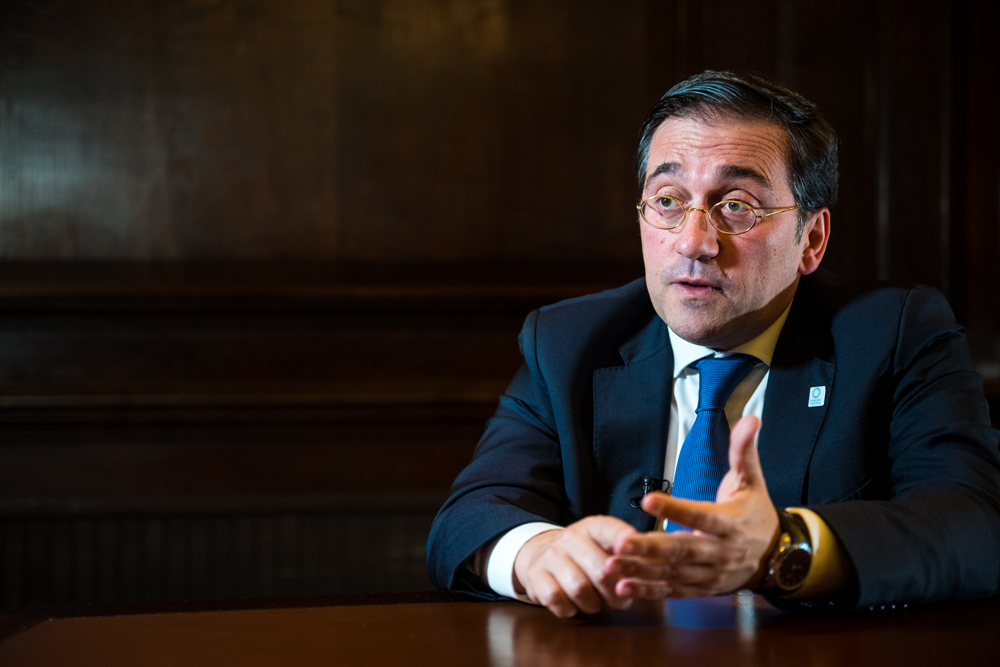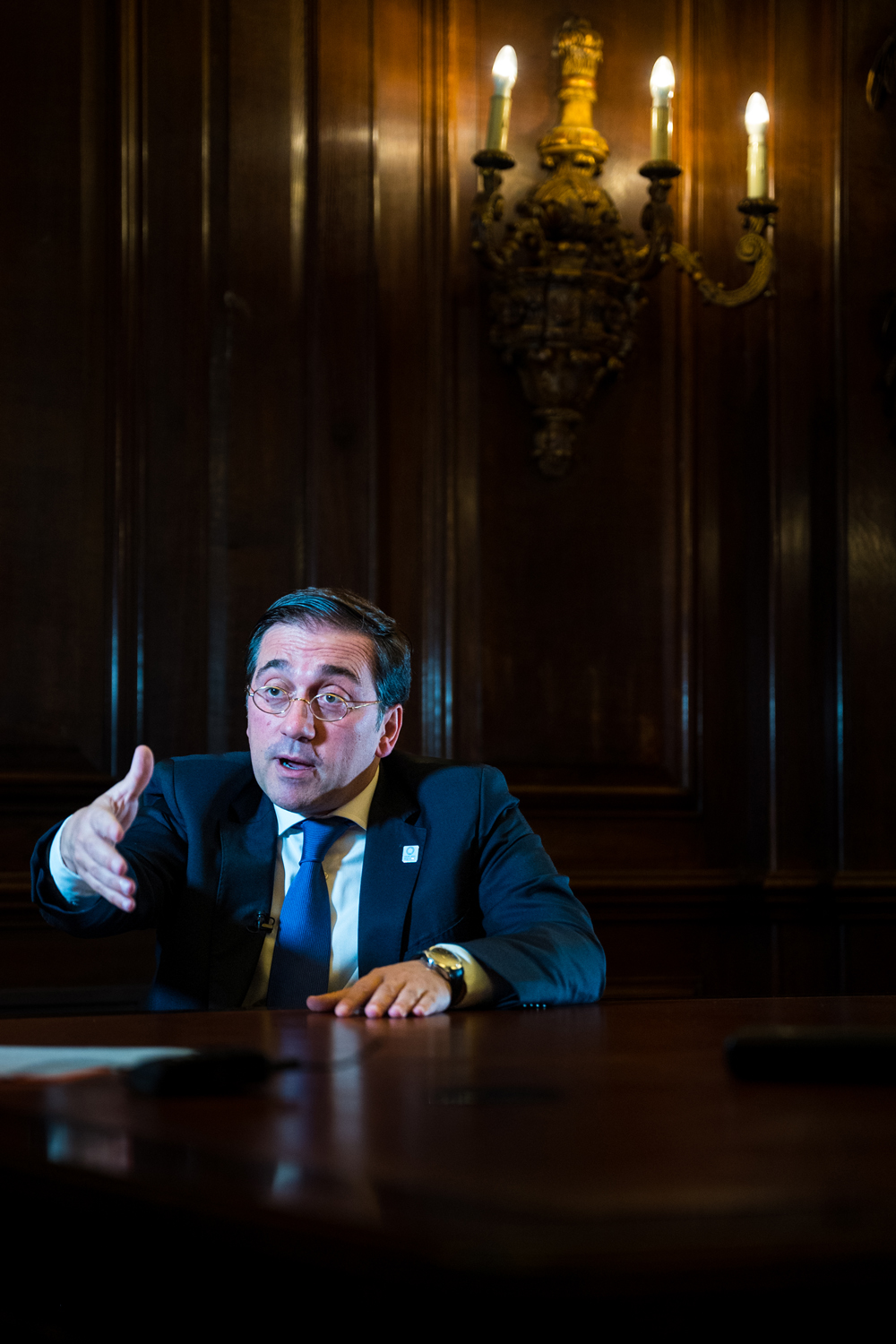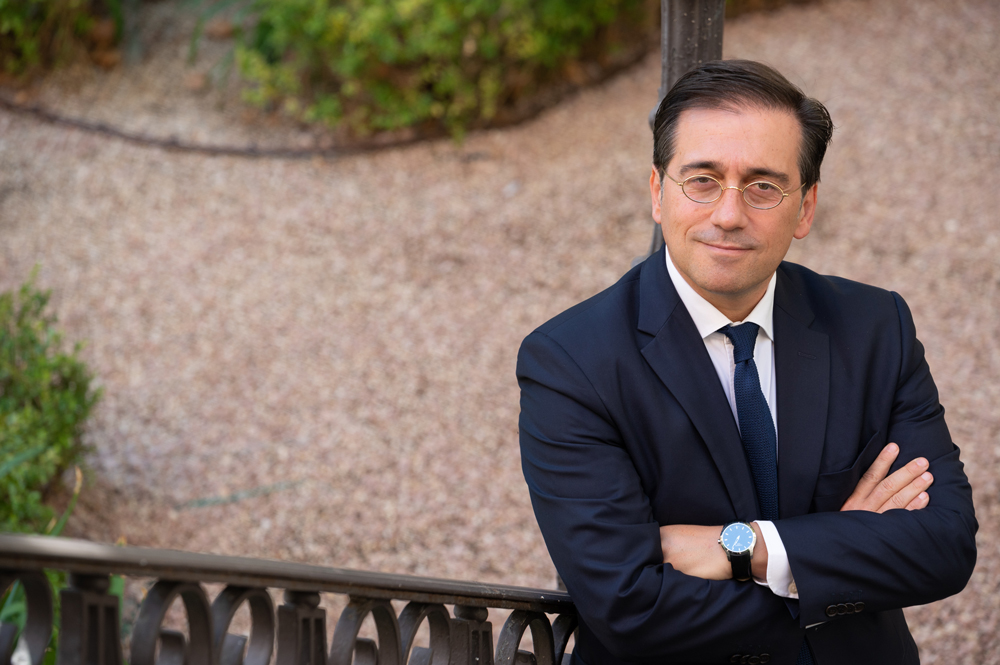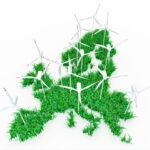CON SELLO PERSONAL
JOSÉ MANUEL ALBARES,
MINISTRO DE ASUNTOS EXTERIORES, UNIÓN EUROPEA Y COOPERACIÓN
MINISTER FOR FOREIGN AFFAIRS, EUROPEAN UNION AND COOPERATION
«El contexto internacional del último año ha sido el más complejo y convulso desde la caída del Muro de Berlín»
‘The international context of the past year has been the most complex and troubled since the fall of the Berlin Wall’
CARLOS CAPA
- Twitter: @capa_carlos
- Mail: [email protected]
«España centrará su presidencia en reforzar la seguridad energética, la recuperación económica y en que la UE sea más relevante en el mundo»
“Spain will focus its presidency on strengthening energy security, economic recovery and making the EU more relevant in the world”
Tras más de un año al frente de un Ministerio de tanta importancia y complejidad, ¿cuál es su balance de esta etapa?
El balance del primer año ha venido marcado por el contexto internacional más complejo y convulso desde la caída del Muro de Berlín. Apenas había tomado posesión del cargo cuando estalló una profunda crisis en Afganistán que nos hizo dar lo mejor de nosotros mismos y de nuestra solidaridad para auxiliar a todos aquellos que perseguía el régimen talibán. Poco después Putin decidió iniciar su ataque ilegal, injusto e injustificado, a Ucrania abriendo una de las crisis más profundas a las que nos hemos enfrentado en los últimos años pero que también ha sido una extraordinaria oportunidad para reforzar la familia comunitaria que formamos los países de la UE. No sólo eso, la OTAN se ha revelado una vez más como un instrumento sólido y eficaz para trabajar hacia una paz que en la exitosa Cumbre de Madrid diseñó el concepto estratégico que nos guiará a los países que formamos parte de la Alianza durante los próximos años. Y, entretanto, seguimos trabajando en la nueva etapa de la relación con Marruecos; por una nueva Ley de Cooperación de la que se beneficien los cooperantes y a quienes va dirigida su acción, pero, sobre todo, para garantizar la paz y la estabilidad mundial.
Dedicamos el tema de nuestra portada a la presidencia española de la UE. ¿Cuáles serán las prioridades?
La agenda de contenidos es algo vivo, pero ya le puedo avanzar que España incidirá en varias líneas generales: recuperación económica, en un momento complicado para los ciudadanos y las familias en Europa; seguridad energética de la Unión, y el refuerzo del papel de Europa en el mundo. Trabajaremos por consolidar los principales ejes de actuación que España ha contribuido a conformar: transición ecológica, transformación digital, pilar social, asilo y migración. Y, en lo que se refiere a prioridades geográficas en las relaciones exteriores de la Unión, serán prioritarias regiones como América Latina y el Caribe y el Mediterráneo.
Ha señalado que España trabaja en una presidencia que refuerce la Unión Europea «para que sea capaz de seguir respondiendo a las crisis que se presenten y que continúe el desarrollo institucional y legislativo de forma que responda a las expectativas de los españoles y los europeos». Sin duda un gran reto… ¿Qué líneas de actuación seguirán?
La experiencia de presidencias recientes demuestra que las prioridades evolucionan en función del contexto en que se desarrolla el semestre, particularmente cuando se producen crisis de gran magnitud que modifican los objetivos inmediatos. No obstante, a unos pocos meses del comienzo de la presidencia española pueden identificarse áreas de trabajo que previsiblemente respondan a estas expectativas, como la consecución de una Europa más independiente y autónoma en todos los ámbitos, cuestiones medioambientales y energéticas, sin olvidar aspectos institucionales como un debate constructivo sobre la composición, funcionamiento y eficacia de la Unión Europea para las próximas décadas.
La invasión rusa de Ucrania y la guerra que la sigue han provocado una respuesta europea sólida. ¿Cómo está contribuyendo España?
España, el gobierno y también todo el pueblo español se han volcado con el apoyo a Ucrania desde el principio, posicionándonos de forma contundente en contra de esta guerra brutal e injusta. En el marco de la Unión Europea y de la OTAN, hemos contribuido con ayuda diplomática, política, humanitaria y militar. Yo mismo viajé a Ucrania este mes de noviembre para entregar 30 ambulancias medicalizadas para atención ginecológica ya que muchos hospitales han sido destruidos por los bombardeos rusos. Nuestra voluntad es la de seguir apoyando a Ucrania en la defensa de su integridad territorial y su soberanía, desde todos los ámbitos posibles hasta conseguir la paz.
¿Qué supone para nuestro país la implementación de las políticas europeas Next Generation?
El instrumento para la recuperación económica, Next Generation EU, constituye un ejemplo de respuesta común de la UE ante los desafíos globales. En el marco de este instrumento, España adoptó en mayo de 2021 su Plan de Recuperación, Transformación y en estos momentos lidera la implementación de los planes de recuperación en Europa, siendo el único país que ha solicitado el tercer pago en 2022. Con la ejecución de este Plan de Recuperación esperamos poder incrementar el nivel del PIB 2,6 puntos porcentuales de media cada año hasta 2031 y las expectativas están, además, orientadas a un cambio en la productividad total de los factores. Ya estamos viendo cómo con el conjunto de reformas e inversiones previsto, y ya en curso, está aumentando el crecimiento de la economía española, a la vez que se promueve un cambio estructural en sectores como el energético, agroalimentario, industrial, tecnológico y digital.

«QUEREMOS PROPONER EL RELANZAMIENTO
COMPLETO DE LAS RELACIONES
ESTRATÉGICAS ENTRE EUROPA Y
AMÉRICA LATINA»
Si volvemos la vista a otras cuestiones: ¿En qué estado están las relaciones entre España y Marruecos?
Marruecos es un país muy importante para nosotros y por eso hemos puesto un gran empeño en reconducir unas relaciones que estaban muy deterioradas. Este ha sido desde el principio para mí, un tema capital. Ahora estamos en una nueva etapa de nuestras relaciones bilaterales en la que ambos países estamos muy satisfechos. En seis meses me he reunido ochos veces con mi homólogo marroquí, Nasser Bourita, y hemos hecho avances muy significativos. Hay datos que confirman esta buena sintonía, por ejemplo, la migración irregular que proviene de África, y que tiene como país de tránsito Marruecos, se ha reducido ya en un 23% mientras todas las rutas están subiendo; nuestros intercambios comerciales han crecido en un 30%, alcanzando las exportaciones españolas los 9.000 millones de euros en lo que llevamos de año y son cifras que esperamos que vayan a mejorar. Se ha retomado la conectividad marítima y aérea y se ha reabierto la frontera con Ceuta y Melilla.
«EL NOTARIADO ESPAÑOL ES CLAVE PARA PODER FACILITAR LAS RELACIONES COMERCIALES Y EMPRESARIALES CON TODAS LAS GARANTÍAS Y LA SEGURIDAD»
Latinoamérica ha dado un giro político en los últimos meses. ¿Qué peso tiene España hoy en la Región?
España concede un lugar prioritario a América Latina y el Caribe como región estratégica en su política exterior y cuando nos enfocamos en agendas de democracia, prosperidad, igualdad, es más fácil encontrarnos y caminar juntos. En ese sentido, estamos trabajando en un importante calendario iberoamericano con citas clave como la XXVIII Cumbre Iberoamericana, que se celebrará en República Dominicana en marzo de 2023, o el lanzamiento de una Alianza Digital UE-América Latina en el primer semestre del año. Además, en la presidencia española del Consejo de la Unión Europea, en el segundo semestre del año, queremos proponer el relanzamiento completo de las relaciones estratégicas entre Europa y América Latina. El objetivo es que Europa y América Latina se vean como lo que son: aliados y amigos estrechos y naturales que compartimos valores y una visión común sobre los grandes desafíos globales.
¿Es la cooperación española uno de nuestros mejores embajadores?
Sin duda es uno de los pilares de nuestra acción exterior y desde el Ministerio hemos hecho una apuesta muy clara con la nueva ley de cooperación, para la que el Gobierno ha obtenido el respaldo de todos los grupos políticos salvo VOX. Se trata de la primera ley de cooperación que se aprueba en 25 años, y la primera que presenta un ministro de Exteriores desde 2014. Con esta norma, que es un verdadero hito de Estado, España se pone a la vanguardia reforzando todo el sistema de cooperación española para adaptarlo a los nuevos desafíos globales, con un modelo más eficiente e innovador, con mejores condiciones para las personas cooperantes y con una AECID reforzada como piedra angular.
El notariado español contribuye a la seguridad jurídica y está presente en 91 países del mundo. ¿Cómo valora su labor?
En un mundo globalizado como el que vivimos y con una economía altamente internacionalizada como es la española, con fuertes inversiones en el extranjero, la seguridad jurídica es una cuestión clave en la que el Notariado español juega un papel crucial. En América Latina, por ejemplo, donde España es el primer inversor europeo y el segundo mundial, sólo por detrás de Estados Unidos, la labor del Notariado español es fundamental para poder facilitar las relaciones comerciales y empresariales con todas las garantías y la seguridad necesaria para el éxito.
After more than a year in charge of a Ministry of such importance and complexity, how would you take stock at this stage?
The course of the first year was marked by the most complex and troubled international context since the fall of the Berlin Wall. I had only just taken office when a profound crisis broke out in Afghanistan, demanding our utmost efforts and solidarity to assist all those persecuted by the Taliban regime. Soon after, Putin decided to launch his illegal, unjust and unjustified attack on Ukraine, opening up one of the deepest crises we have faced in recent years, but which has also been an extraordinary opportunity to strengthen the family of EU countries. Not only that, but NATO has once again emerged as a strong and effective instrument to work towards a peace which at the successful Madrid Summit generated the strategic concept that will guide the countries that belong to the Alliance over the coming years. In the meantime, we are continuing to work on the new stage of the relationship with Morocco; on a new Cooperation Act which helps aid workers and the beneficiaries of their actions, but above all aims to ensure peace and global stability.

We dedicate our cover to the topic of the Spanish presidency of the EU. What will the priorities be?
The content agenda is a living entity, but I can already tell you that Spain will have an impact on several broad lines: economic recovery, at a difficult time for citizens and families in Europe; energy security in the Union; and strengthening Europe’s role in the world. We will work to consolidate the main areas of action that Spain has helped shape: ecological transition, digital transformation, social pillar, and asylum and migration. With regard to geographical priorities in the Union’s external relations, priority will be given to regions such as Latin America and the Caribbean, and the Mediterranean.
You indicated that Spain was working on a presidency that would strengthen the European Union «so that it can continue to respond to any crises that might arise, with institutional and legislative development continuing in response to the expectations of Spaniards and Europeans.» Undoubtedly a great challenge… What are the lines of action?
The experience of recent presidencies shows that priorities evolve in line with the context of the six-month period, particularly when large-scale crises emerge, and change the immediate objectives. However, a few months before the Spanish presidency begins, the areas of work that are expected to meet these expectations may be identified as the achievement of a more independent and autonomous Europe in all areas, environmental and energy issues, without overlooking institutional aspects such as a constructive debate on the composition, functioning and effectiveness of the European Union for the coming decades.
The Russian invasion of Ukraine and the ensuing war have provoked a strong European response. How is Spain contributing?
Spain, the government and also the entire Spanish people, have thrown themselves into supporting Ukraine since the outset, positioning us strongly against this brutal and unjust war. Within the framework of the European Union and NATO, we have contributed with diplomatic, political, humanitarian and military assistance. I myself travelled to Ukraine in November to deliver 30 medically equipped ambulances for gynaecological care, as many hospitals have been destroyed by Russian bombing. Our determination is to continue to support Ukraine in defending its territorial integrity and sovereignty, in every possible sphere, until peace is achieved.
What does implementing European Next Generation policies mean for Spain?
As the instrument for economic recovery, Next Generation EU is an example of a joint EU response to global challenges. Under this instrument, Spain adopted its Recovery and Transformation Plan in May 2021 and is currently leading the implementation of recovery plans in Europe, as the only country to request the third payment in 2022. Through the implementation of this recovery plan, we expect to be able to increase the level of GDP by an average of 2.6 percentage points each year until 2031, and expectations are also geared towards a change in total factor productivity. We are already seeing that with the set of reforms and investments planned, and those already underway, Spanish economic growth is increasing, while promoting structural change in sectors such as energy, agri-food, industry, technology and digital transformation.
“WE AIM TO PUT FORWARD A COMPLETE RELAUNCH OF STRATEGIC RELATIONS BETWEEN EUROPE AND LATIN AMERICA”
Turning to other issues: What is the state of relations between Spain and Morocco?
Morocco is a very important country for us, which is why we have made a great effort to put back on track a relationship that had deteriorated greatly. This has been a major issue for me from the beginning. We are now at a new stage in our bilateral relations, with which both countries are very satisfied. In six months I have met eight times with my Moroccan counterpart, Nasser Bourita, and we have made very significant progress. The figures confirm these positive vibes. For example, irregular migration from Africa, with Morocco as the transit country, has already decreased by 23% while all other routes are increasing; our trade has increased by 30%, with Spanish exports amounting to 9 billion euros so far this year, and these figures we hope will improve further. Transport connections by air and sea are again being looked at, and the border with Ceuta and Melilla has been reopened
“SPANISH NOTARIES ARE VITAL IN FACILITATING COMMERCIAL AND BUSINESS RELATIONS WITH THE UTMOST GUARANTEES AND SECURITY”
Latin America has seen a political shift in recent months. What weight does Spain have in the region today?
Spain gives priority to Latin America and the Caribbean as a strategic region in its foreign policy, and when we focus on agendas of democracy, prosperity, equality, it is easier to find common ground and advance in unison. In this regard, we are working on a major Ibero-American calendar with key events such as the 28th Ibero-American Summit, to be held in the Dominican Republic in March 2023, and the launch of an EU-Latin America Digital Alliance in the first half of the year. Furthermore, during the Spanish presidency of the Council of the European Union in the second half of the year, we aim to put forward a complete relaunch of strategic relations between Europe and Latin America. The goal is for Europe and Latin America to be seen as what they are: close and natural allies and friends who share values and a joint perspective as to the great global challenges.
Is Spanish cooperation one of our best ambassadors?
It is undoubtedly one of the pillars of our action overseas, and our ministry has made a very clear commitment with the new Cooperation Act, for which the Government has obtained the support of all political groups except VOX. It is the first cooperation legislation to be passed in 25 years, and the first bill presented by a foreign minister since 2014. With this new standard, which is a real milestone of statesmanship, Spain is leading the way by strengthening the entire Spanish cooperation system to align it with new global challenges, with a more efficient and innovative model, with better conditions for aid workers and with a stronger AECID agency as a cornerstone.
The Spanish notariat contributes to legal certainty, with a presence in 91 countries around the world. How do you rate its work?
In such a globalised world as we have today, and with a highly internationalised economy as in the case of Spain, with substantial investments abroad, legal certainty is a key issue in which the Spanish notariat plays a crucial role. In Latin America, for example, where Spain is the leading European investor and the second largest from anywhere in the world, behind only the United States, the work of the Spanish notariat is essential in order to facilitate commercial and business relations with the utmost guarantees and the security required for success.
Huella digital / Digital footprint
JOSÉ MANUEL ALBARES tiene cuenta en la red
social Twitter, desde la que informa y opina de
asuntos relacionados con su actividad institucional en
la dirección @jmalbares. También dispone de un perfil
en Linkedin.
JOSÉ MANUEL ALBARES has an account on the social media platform Twitter, via which he posts information and opinions on matters related to his institutional activity, at @jmalbares. He also has a LinkedIn profile
La página web de La Moncloa ofrece una entrada con el perfil y biografía del ministro.
The website of La Moncloa offers an entry with the minister’s profile and biography.




